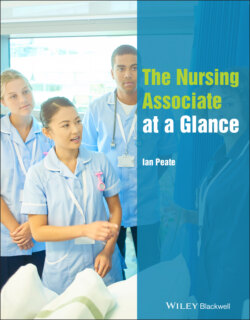Читать книгу The Nursing Associate at a Glance - Ian Peate - Страница 14
Оглавление2 Legal and ethical
At the point of registration, the Nursing Associate will be able to: understand and apply relevant legal, regulatory and governance requirements, policies, and ethical frameworks, including any mandatory reporting duties, to all areas of practice.
Figure 2.1 The law and ethics.
Figure 2.2 Ethics.
Table 2.1 Governance.
| Clinical governance addresses activities that can help to maintain and improve high standards of patient care. | |
| Policies | National policies have a major impact on the resourcing of services; they also set performance indicators and evaluation criteria. Policies exist that define and integrate appropriate standards for delivery of care, addressing conditions necessary for that care to occur. |
| Protocols | A document developed to guide decision‐making around specific issues. Protocols exist for a wide range of activities. These can range from clinical issues such as caring for someone with an infection through to the procedures required to provide nurse‐led physical exercise intervention for people with dementia. |
| Standards | These reflect a desired and achievable level of performance against which a Nursing Associate’s actual performance can be compared. The key aim/purpose is to direct and maintain safe and clinically competent nursing practice. |
| Guidance | Guidelines are evidence‐based recommendations for health and care. They set out the care and services suitable for most people with a specific condition or need and for people in particular circumstances or settings. |
| Procedures | Using an evidence base. These detail how to do things, for example, the principles of hand hygiene and the procedure for cleaning the hands. |
Top Tip
With regard to policies, protocols, standards, guidance and procedures – know them, read them, use them.
The law and ethics
The law and ethics permeate every aspect of nursing practice. Often Nursing Associates and others ask the questions ‘what is legal' and 'how do I decide what is right' so that I might practise safely and ethically. The law and ethics are intimately related to each other, often overlapping (Figure 2.1). Legal and regulatory frameworks come in the form of law and the Code (NMC, 2018).
Ethics
Ethics can be described as moral philosophy. This is a system of moral principles that are concerned with what is good for individuals and for society. Each interaction the Nursing Associate has with patients involves making a judgement about right or wrong, good or bad. Underpinning each interaction, the principles of patient‐centred care are utilised, engaging with the patient at all times. The Nursing Associate needs ask whenever providing care or offering support: is this in the best interests of the patient?
The ethical principles
The four key ethical principles address a value that arises in interactions between healthcare providers and patients. The principles address the issue of being fair, honest and having respect for fellow human beings (see Figure 2.2).
Autonomy
Everybody has the right to control what happens to their bodies (self‐determination) based on their values and belief system. Respecting the principle of autonomy means that an adult person who is informed and competent can refuse or accept treatment, drugs and surgery aligned with their wishes. People have the right to control what happens to their bodies because they are free and rational. Decisions made must be respected by everyone, even if those decisions are not in the patient’s best interest.
Beneficence
Those who provide health and social care must strive to improve the health of those whom they provide care and support to, to do the most good for the patient in each situation. However, what might be good for one patient may not be good for another, and each situation is considered individually. This principle is about doing good and avoiding malevolence.
Non‐maleficence
This principle is the essence of healthcare ethics and is concerned with ‘First, do no harm’. At all times the Nursing Associate must avoid causing harm to patients, protecting them from harm.
Justice
The final principle requires the Nursing Associate to be as fair as possible when offering treatment to patients and allocating scarce resources. Access to care should be equitable. At all times the Nursing Associate must be able to justify their actions in each situation.
Law
Law is a system of rules and guidelines enforced through social institutions such as the criminal justice system to govern behaviour. Law plays a key role in the provision of contemporary health and social care. Much legislation has been passed that has a profound effect on how care is delivered, for example, the Children Act, The Mental Health Act, Capacity Act and the Health and Social Care Act.
Parallels with ethics and law
Ethics and law are closely related. Laws are made based on the moral values of society (in general), describing the basic behaviour of people. They represent the minimum standards of human behaviours, that is, ethical behaviour. Laws and ethics are systems that maintain a set of moral values, preventing people from violating them, providing people with guidelines on what they may or may not do in specific situations.
Ethics comes from people’s awareness of what is right and what is wrong. The Code, for example, is enshrined in ethics (see Chapter 1). Laws however, are written and approved by governments. Ethics can vary from person to person as different people can have different opinions on a particular issue. Laws describe what is illegal regardless of the different opinions people might have. In general, ethics are not well defined; however, laws are defined and precise.
Governance requirements are usually in the form of policies, protocols, standards, guidance and procedures (see Table 2.1). Clinical governance activities can help to maintain and improve high standards of patient care.
